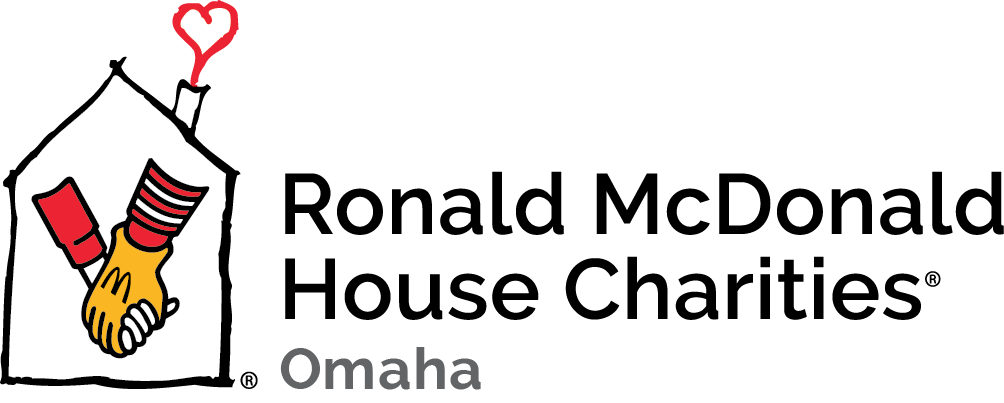Inspiring Awe
There’s a TikTok video of a mother, father and daughter, and as you watch, you can’t help but smile. You see the joy in their faces, the radiant grin of a child who knows how adored she is. You see the parents brimming with pride, their eyes fixated on their whole world, refusing to take the moment for granted. You hear the love in their voices, and despite the child’s medical condition, you feel the hope they so clearly hold. You see a family in the midst of seemingly impossible circumstances, and yet, they are handling it with poise and optimism, and it all gives you a feeling of awe. 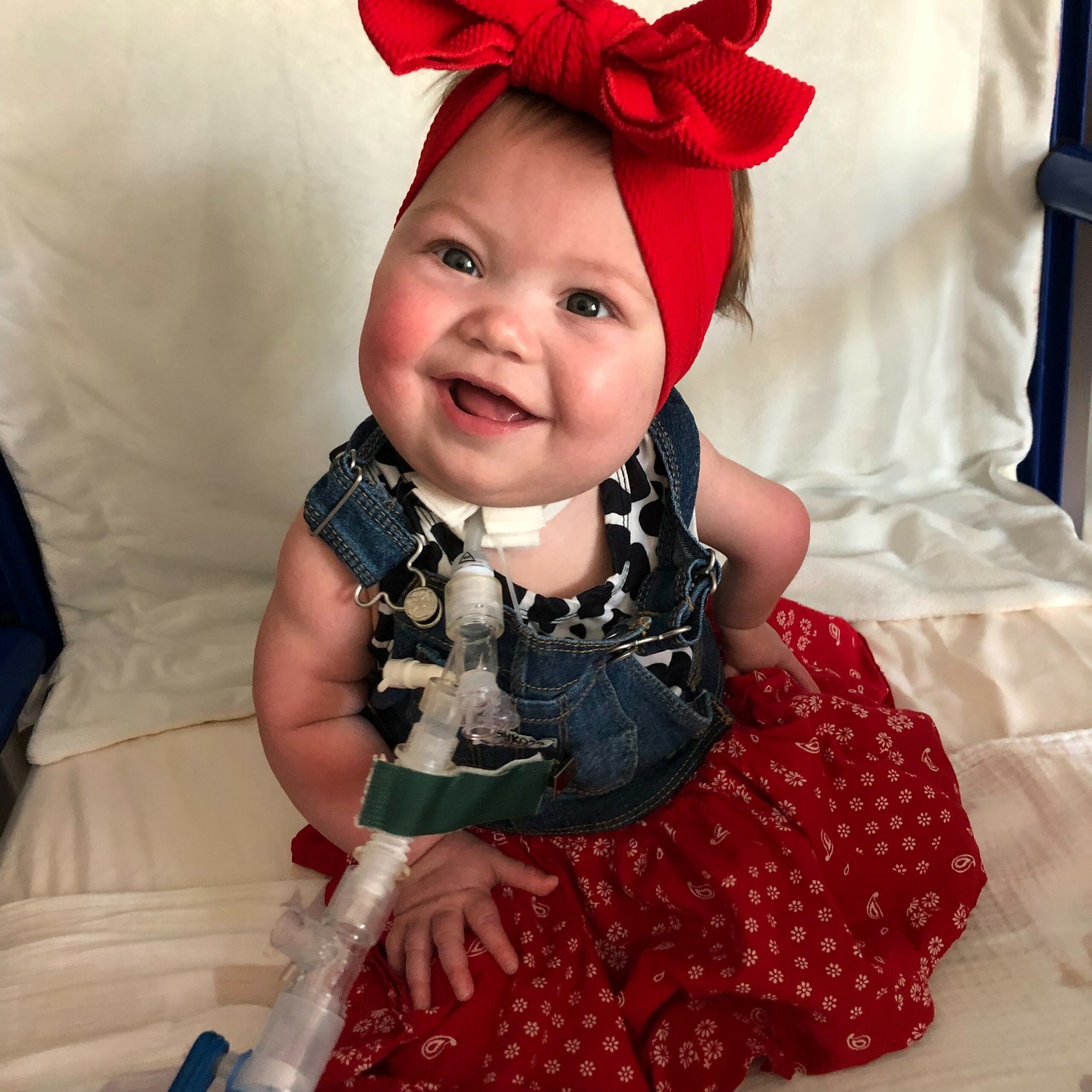
The source of that awe is a one-year-old girl named Emery McVicker.
Paxton and Rebeka McVicker are originally from Sterling, Nebraska, a town of about 500 located southeast of Lincoln. They grew up together, joined the military together, and were stationed in Fort Hood, Texas together. In early 2020, they received news that their family would be growing.
Because of COVID precautions, Paxton was unable to be in the room for Rebeka’s 20-week ultrasound, but they could still find out the baby’s gender together afterward, and the appointment was only going to take 45 minutes. Rebeka entered the room feeling joyful anticipation. A few minutes into the ultrasound, as the technician was running through the standard procedure, she noticed something. The baby’s left arm was not as developed as the right, and there were only four fingers present. More concerning was the revelation that there was a hole in the baby’s diaphragm, a condition known as congenital diaphragmatic hernia, or CDH.
As Rebeka sat there, listening to the news, she couldn’t help but feel alone. Her husband was unable to be there with her, and the ultrasound technician said this was the first case of CDH she had seen in her 20-plus years of doing this.
She recalls thinking how uncomfortable that made her. “That was really hard. Like, no one’s heard of this?”
Johns Hopkins reports CDH occurs in one out of every 2,500 live births, and research from C.S. Mott Children’s Hospital indicates the survival rate for children with CDH hovers between 65 and 70 percent.
After the 45-minute appointment passed the two-hour mark, Rebeka had taken in as much information as she could, and she left to fill in her husband on all that transpired. She told him that there’s a chance their baby – a girl, they learned – might not survive, and they would have to prepare for that possibility.
They also decided that regardless of if that possibility came to pass, they would do everything in their power to give their daughter the best life they could, for as long as they could. Rebeka says, “I had a lot of questions for the doctors because I was so determined to give her the best life.” That determination made learning about the diagnosis easier than she expected, despite her having no medical background.
Over the final few months of Rebeka’s pregnancy, she and Paxton learned and prepared as much as possible, until mid-September, when the baby was born at a children’s hospital in Houston, Texas. They named her Emery, and on her second day of life, she underwent a surgery to repair the hole in her diaphragm. The CDH also caused an issue with her lungs, which meant even more procedures were required to give Emery the best chance to survive.
The hospital was roughly three hours from their home in Fort Hood. Thankfully, the hospital had a Ronald McDonald House in the building, which offered them a place to stay for a few days at a time, but still Rebeka says the experience was “nerve-wracking.
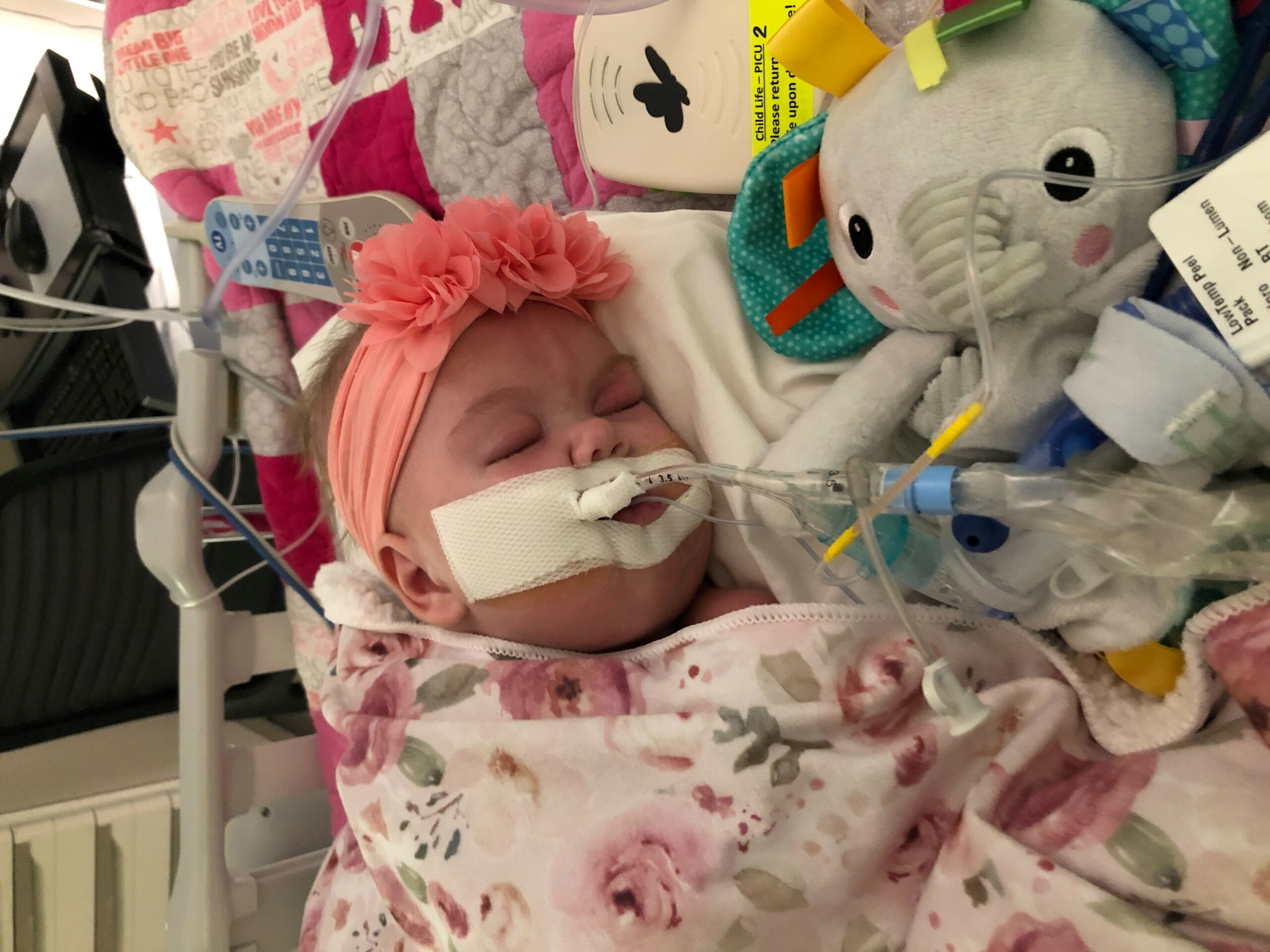
“I was still recovering in the hospital, my husband and I couldn’t be in the NICU at the same time, even after her surgery. And my husband had to figure out his work and everything. It was all so hard.”
But little by little, the stress began to lessen. Rebeka and Paxton spoke with their families back in Nebraska daily, which gave them comfort they desperately needed. The military was very accommodating for Paxton, pushing his deployment back a few months to allow him to be with his family. And eventually, after two months in the NICU, Emery was doing well enough to go home.
From late November until Christmas, Emery continued to improve. She still had a feeding tube, but other than her left arm deformity, she seemed almost normal. She cooed, she cried. “It was amazing,” Rebeka says.
The whole family decided to come back to Nebraska for the holidays, to allow everyone to meet their little bundle of joy. The trip was going well until New Year’s Eve, when Rebeka noticed Emery wasn’t quite acting like herself. She was sluggish, lethargic, and swollen – Rebeka says she looked like a little marshmallow – so they decided to take Emery to the emergency room in Lincoln. Immediately, the doctors could tell something wasn’t right. She was life-flighted to Children’s Hospital and Medical Center in Omaha, where they discovered Emery had pulmonary hypertension and right-side heart failure.
Essentially, Rebeka explains, the walls of Emery’s blood vessels were constricted between her lungs and heart, and it’s possible that increased pressure led to the right side of her heart failing.
The doctors at Children’s helped Emery get on the track to recovery (“The pulmonary hypertension team at Children’s is amazing,” Rebeka says.) until she caught a cold. For most children, the common cold leads to discomfort, coughing, maybe a runny nose. For Emery, things were far more complicated.
Rebeka says, “She had a nasal cannula, and she still wasn’t able to get enough oxygen.” To remedy this, the doctors would need to perform a tracheostomy. But first, they had to get rid of the cold virus, so Emery was put under, and a breathing tube was inserted. For the next few days, they monitored Emery as the infection ran its course. As her condition improved, the doctors moved forward with the trach tube.
Nothing about Emery’s five-month-long life to this point had been easy, for her or her parents. But the time after the trach was inserted may have been the most difficult for Rebeka and Paxton.
In the aftermath of that procedure, Emery could not make a sound. When she would attempt to cry, she would open her mouth, but the only noises to be heard were the beeps and buzzes of monitors and machines. Rebeka looks back at those weeks and explains just how painful it was:
“It gets tiring hearing a baby cry, just ask any parent. But when that gets taken away, and your child needs a trach, and who knows how long it will be until they’re able to talk? It’s devastating to not hear that.”
Rebeka would often walk into Emery’s room and see that she’s in physical pain, crying out without a sound, and her heart would sink. “I would turn to my husband and say, ‘I just want to hear something.’”
While Emery still couldn’t speak, by early March she was stable enough to be transferred to a rehab facility, Ambassador Health of Omaha, where she could continue to recover. It was at that point that Rebeka and Paxton were introduced to Ronald McDonald House Charities in Omaha. As soon as they walked in, Rebeka says, “it felt like home.”
They loved the spacious rooms, the pantry, and perhaps most of all, the people. “Everyone is so nice there!” Rebeka extends that praise to the staff, volunteers, and donors.
“It’s amazing to see how many people donate and come together in times like these, you know? They don’t know any of us, but the people are so willing to give.”
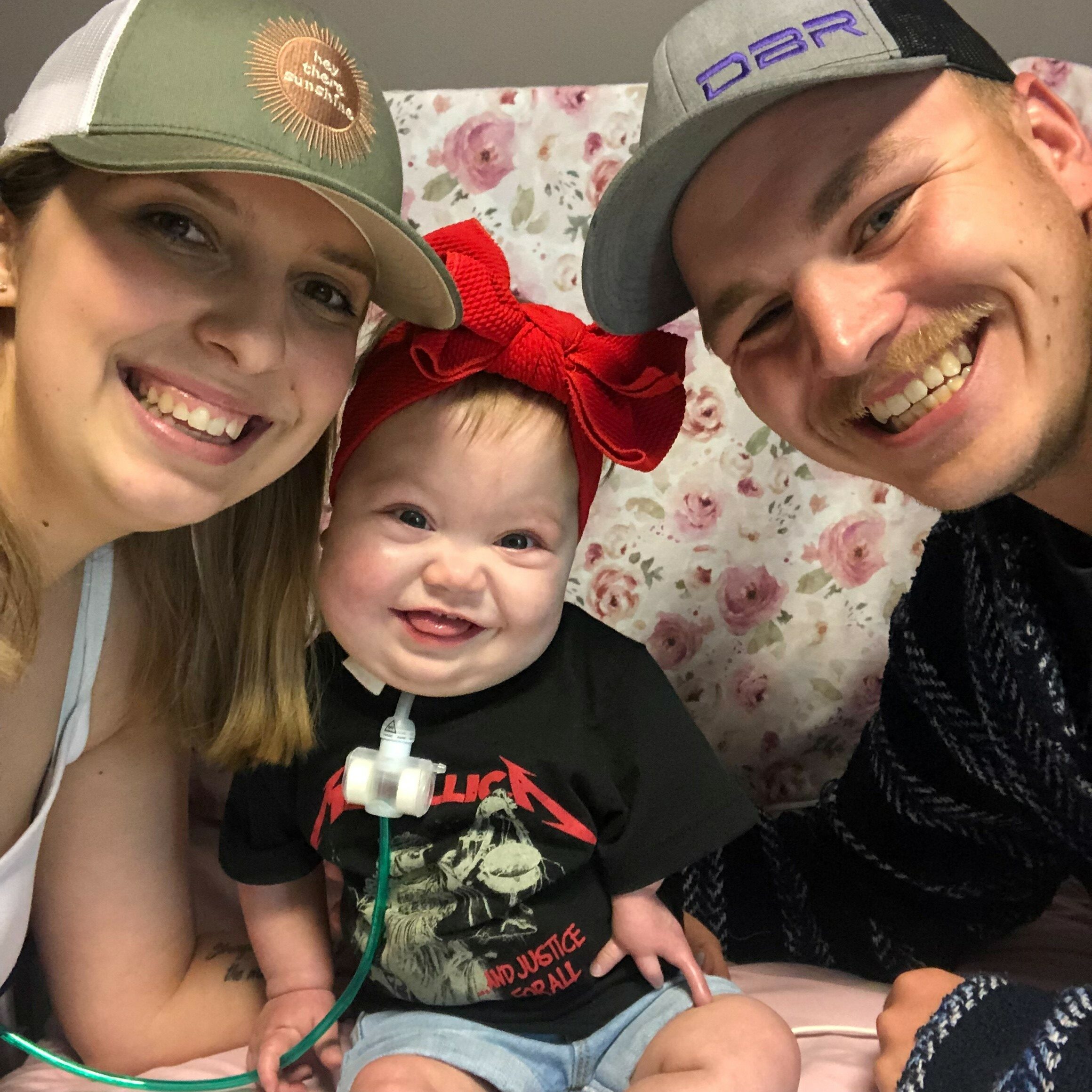
Rebeka also greatly appreciate having other families in the House on whom she could lean on when things got tough, especially when Paxton had to return home for work. She says it was hard not having her best friend there, but the fact that she can talk to other parents experiencing similar circumstances allows her to not feel like she’s going through this alone.
As Emery recovered, Rebeka was responsible for learning as much as possible about the trach, the ventilator, and everything else related to her daughter’s condition. The team at Ambassador provided the training, and although Rebeka had been handling trach changes and cares since Emery was at Children’s, Rebeka says she never stops asking questions, never stops learning. That includes picking up pieces of advice from other families in the House, as well as figuring out some tricks of their own.
As any parent can attest, sometimes it can be difficult for a months-old child to lie still when you need to perform a task, whether it’s changing a diaper or changing a trach. For Emery, those tasks have been made easier thanks to a little help from the Ronald McDonald House.
Rebeka explains, “When we got to the House, we were able to pick out a toy from the toy room to give to Emery, and we chose this little television-like thing that plays the Winnie the Pooh theme song. Emery loves it, and whenever we need to do her cares, we put that in front of her and we’re able to get everything done without any extra wiggling or crying.”
Oh, the crying. A few months after the tracheostomy, Emery finally regained her ability to speak. Granted, a nine-month-old “speaking” is probably a generous phrase, but for Rebeka, simply hearing those noises brought them immense joy.
“Paxton was set to come back here from work around the middle of June, and about a week before that, Emery started making a few noises here and there. When my husband got here and heard that, he absolutely ate it up. He loved every second of it, like, ‘oh my gosh, did you hear that?!’”
With her voice back, Emery makes sure anyone around knows how she’s feeling. Rebeka says that while “Emery will let you know when she doesn’t like something, she mostly likes everything. She’s the happiest baby I have ever seen. She smiles almost all the time.”
She adds that like all kids that age, “Emery fights her sleep quite a bit, and she is so sassy,” but as she’s recently celebrated her first birthday, Rebeka can’t help but admire her daughter.
“I think it’s so amazing to see how she made it through all of this.”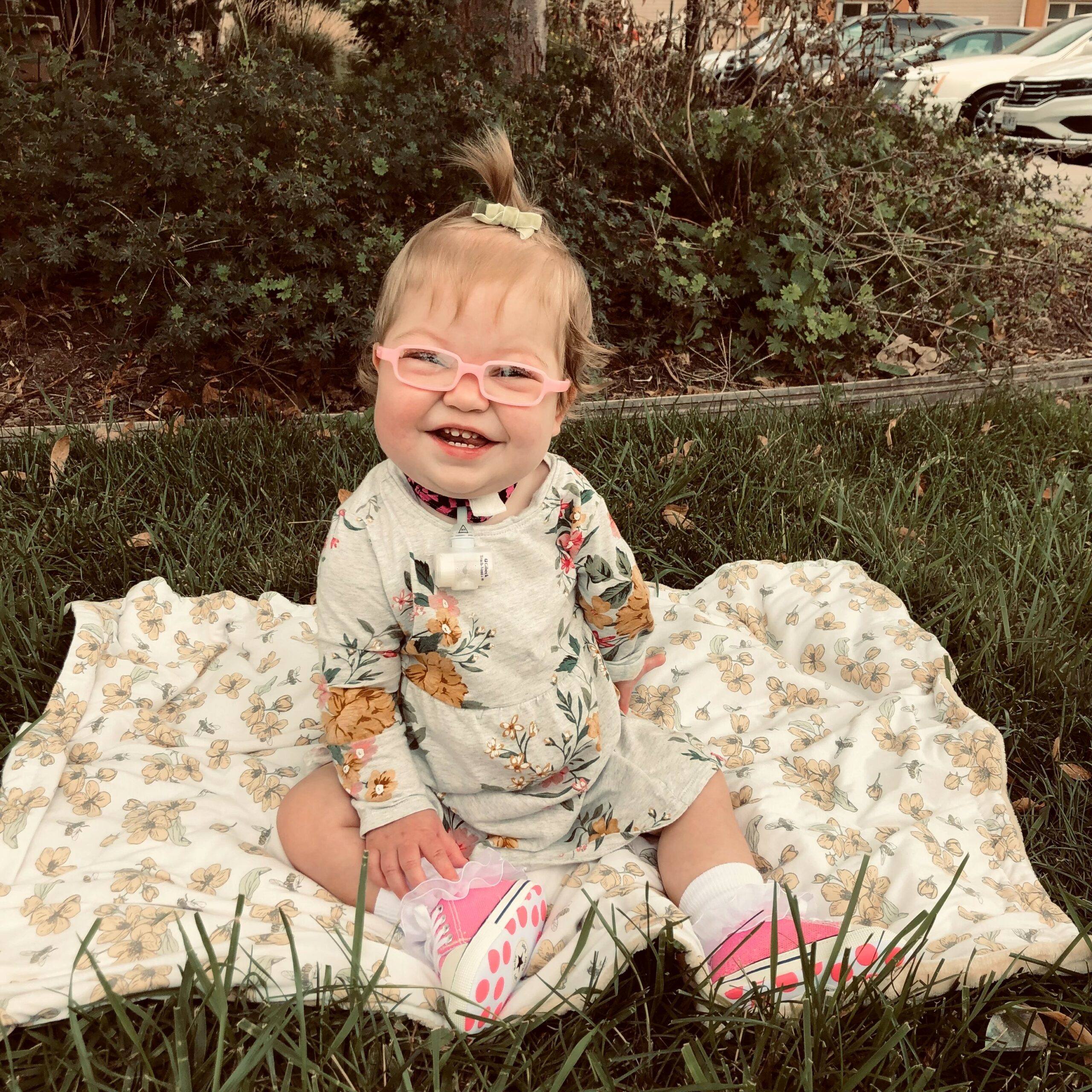
Emery continues to grow and develop, with the help of her various therapies (speech, physical, and occupational). She sits up on her own, and she speaks more and more every day, showcasing that sassy personality her parents love so dearly. And while she has yet to crawl, she’s still catching up on the development curve, and her medical team is hoping that by kindergarten Emery will be able to breathe on her own, without the trach.
A first birthday. Sitting upright independently. Crawling. Kindergarten. All milestones that Rebeka and Paxton weren’t sure their daughter would have the chance to reach. And yet, she’s either reached them already, or is well on her way to doing so.
And as her mom says, “she did it with a huge smile on her face.”
Rebeka hopes that she can take Emery home soon, but at this point, it’s something that’s out of her control, as the only real hang-up is that they need an in-home nurse before Emery can be discharged. “There’s no real timeline. There’s a shortage of nurses everywhere, and our town is very small and very rural, so it’s going to be especially hard to get her a nurse.”
She passes the time by playing with Emery, learning, and making TikTok videos (including answering questions from curious followers). Other than that, all Rebeka can do is to keep doing what she’s been doing. Care for Emery. Make her laugh. Enjoy her smile. Give her the best life possible. Most of all, simply be there for her. That’s a whole lot easier when she has a room at the Ronald McDonald House.
When discussing the most beneficial parts of the House, Rebeka initially mentions the 24/7 laundry room before correcting herself. “It’s not even just the laundry, it’s everything. They have laundry soap for you, they have food for you, they have it all. They make sure that no family goes without anything.
“I’m in awe of everything the Ronald McDonald House does. It’s really amazing.”
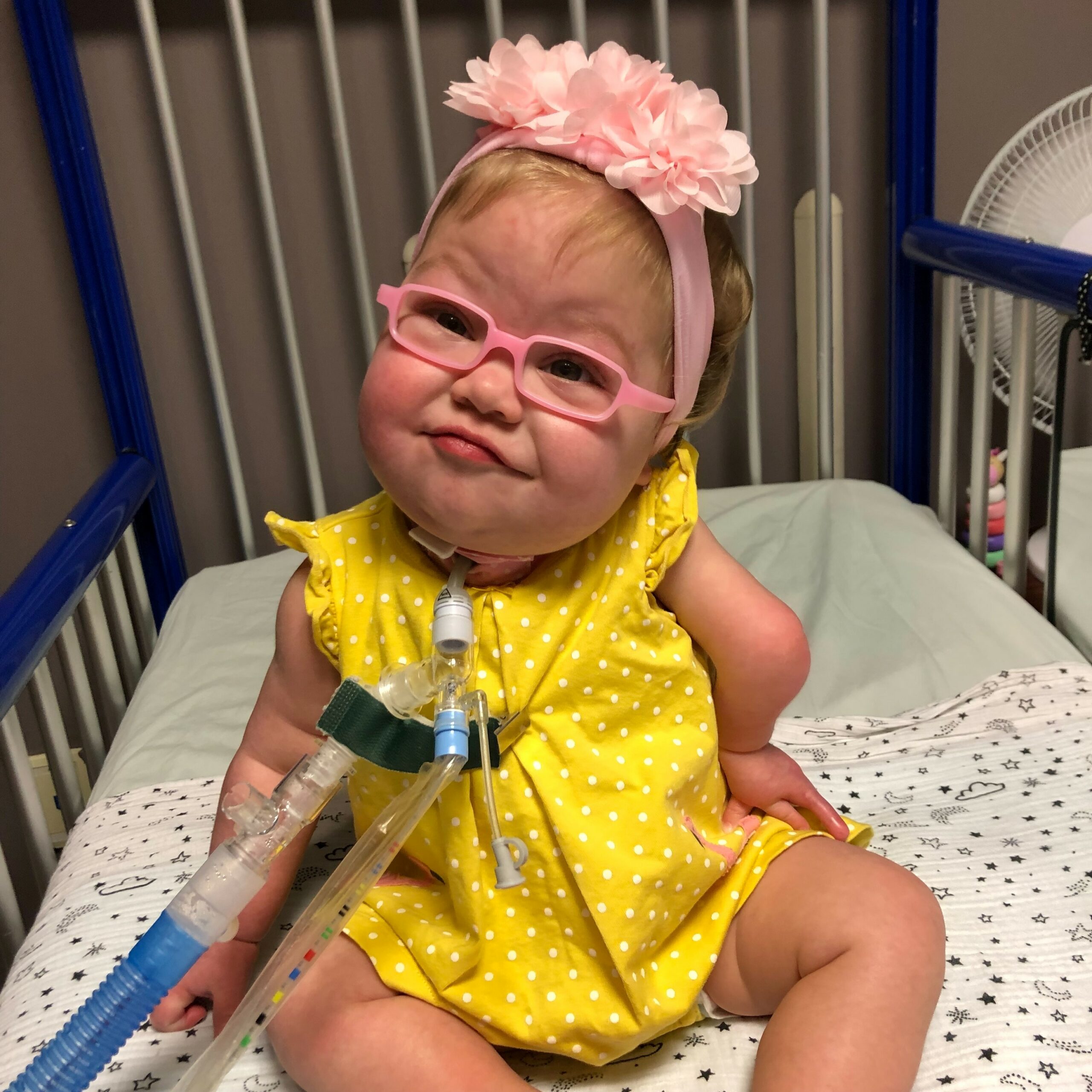
To provide the little things that make a big difference for families like Emery’s, make a donation today.
